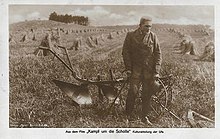| Struggle for the Soil | |
|---|---|
 | |
| Directed by | Erich Waschneck |
| Written by |
|
| Based on | From My Farming Days by Fritz Reuter |
| Starring | |
| Cinematography | Friedl Behn-Grund |
Production company | |
| Distributed by | UFA |
Release date |
|
| Country | Germany |
| Languages |
|
Struggle for the Soil (German : Kampf um die Scholle) is a 1925 German silent film directed by Erich Waschneck and starring Gustav Oberg, Ferdinand von Alten, and Oskar Marion. [1] It is based on the classic novel From My Farming Days by Fritz Reuter.
Contents
The film's art direction was by Botho Hoefer, Hans Minzloff, and Bernhard Schwidewski. It was shot on location in Lensahn in Holstein.